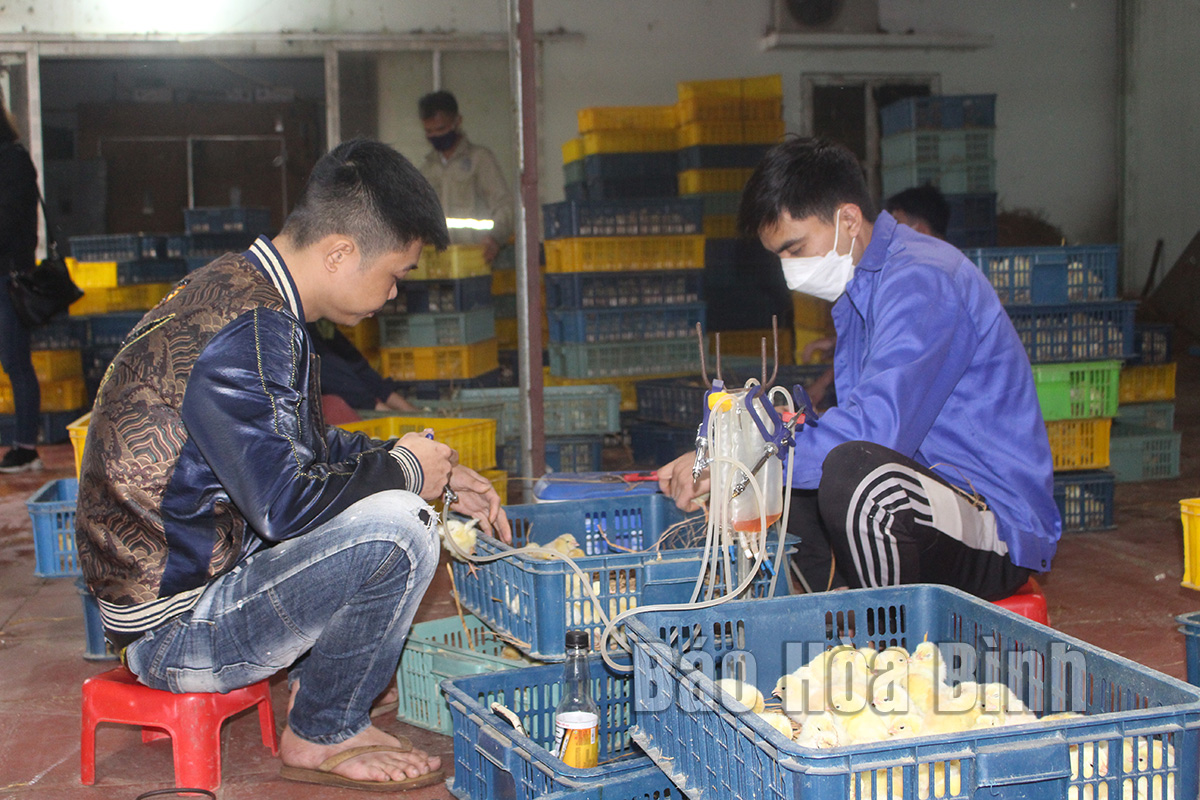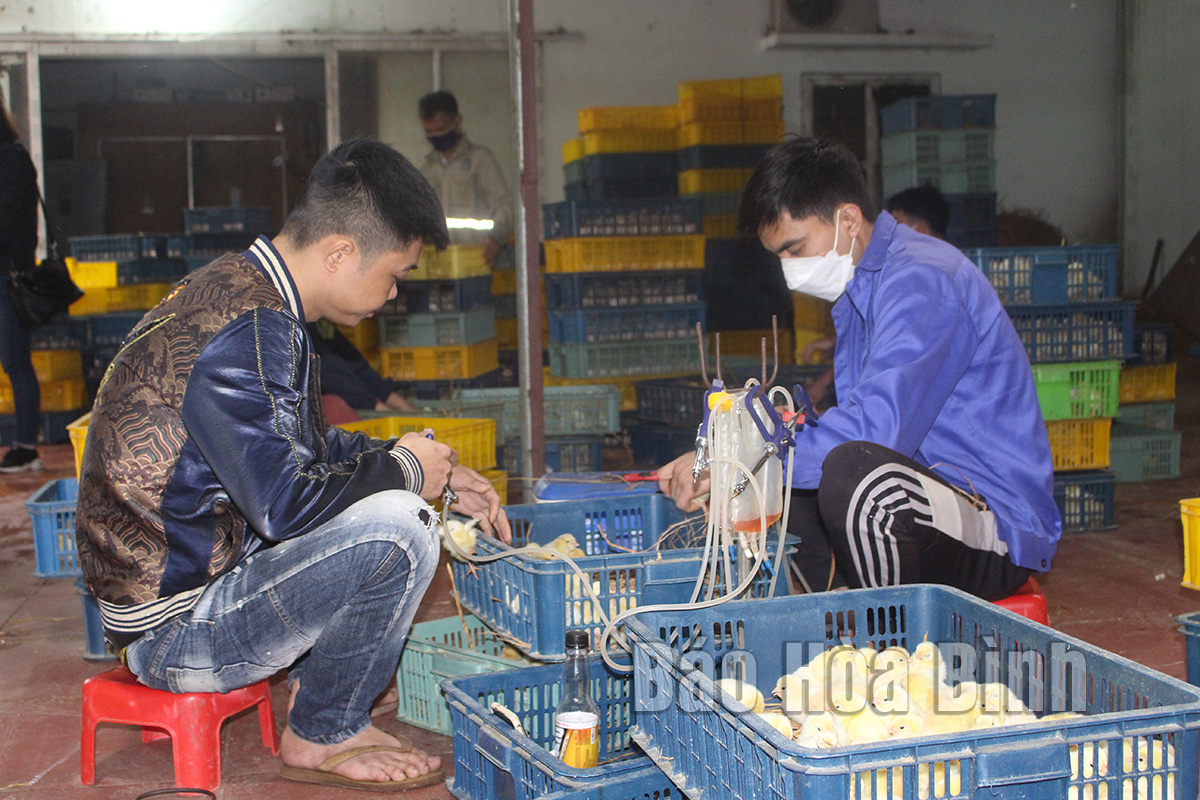
(HBO) – All data of cooperatives in Lac Thuy district has been connected to the national information system on cooperative registration. Cooperatives have applied high technology to make products that meet One Commune One Product (OCOP) programme, organic or global good agricultural practices (GlobalGAP) standards. In addition to expanding consumption markets, many have pioneered in putting their products on sale on e-commerce platforms namely Voso.vn and Postmart.vn as well as social networks like Facebook or Zalo.
Tuan Chuyen Livestock Breeding
Service Cooperative in Lac Thuy district’s Phu Thanh commune applies advanced
technology in production.
Implementing digital transformation in
cooperatives, the district Steering Committee for Collective Economic
Development, in coordination with the provincial Post Office and Viettel Post,
has organised training courses and communication campaigns for cooperatives on
digital transformation; provided guidance on online sales skills and posted
products on the e-commerce trading floors. The cooperatives have been supported
in building a collective brand for Lac Thuy oranges; using certification marks
for Lac Thuy chicken, Lac Thuy goat, Lac Thuy custard apple, Song Boi tea and
OCOP products. They have also received assistance in the application of science
and technology which served the development of key products with export
potential; and in promotion of research on post-harvest preservation and
processing technology suitable to the locality’s condition. The development of
organic and clean agricultural cooperatives has been encouraged.
The district currently has 47
cooperativesoperating under the Law on Cooperatives 2012, including 38
agricultural, four handicraft, two transport service and three commercial service
ones.
The implementation of digital transformation in
cooperatives has changed their operation organisation and management compared
to traditional methods; improving the quality and efficiency of their
activities.
As one of the province’s outstanding
cooperatives, Son Nam Cooperative has created jobs for many local workers with
an average income of 6 million VND (253 USD) per month. The annual revenue of
the cooperative is over 4.6 billion VND.
Bui Thi Lan, Director of Son Nam Cooperative,
said the cooperative has poured capital into raising chickens, pigs, buffaloes
and cows, planting fruit trees; and many other services. It also focuses on
investing in advanced technology and equipment to reduce the environmental
pollution.
Son Nam Cooperative now has a flock of over
5,000 chickens, supplying the market with about 3,000 eggs a day. The Ngoc Han
egg of the cooperative has been certified as a provincial-level OCOP product
and put on the e-commerce platform Postmart.vn.
According to the district Steering Committee for
Collective Economic Development, there are still difficulties in the
implementation of digital transformation in cooperatives.
A number of cooperatives have applied high
technology in their production and business activities, but due attention
hasn’t been paid to the application of technology in product processing and
promotion. Low capacity of human resources, especially managers at agricultural
cooperatives, is also a matter.
In the coming time, it is necessary for the
district to get support from agencies and sectors at all levels in terms of
capital and technology to help cooperatives with modern and sustainable
production, especially facilitating the introduction of their products on
e-commerce trading floors./.
According to data from the Hoa Binh Provincial Party Committee, the industrial production index for the first six months of 2025 is estimated to have increased by 20% compared to the same period last year. This marks the highest year-on-year growth rate for this period since 2020.
In the first six months of 2025, Hoa Binh province’s export turnover was estimated at 1.145 billion USD, marking an 18.11% increase compared to the same period in 2024. Import turnover was estimated at $ 804 million, a 17.15% increase, which helped the province maintain a positive trade balance.
The lives of the ethnic minority farmers in Tan Lac district have gradually improved thanks to the new directions in agricultural production. This is a testament to the collective strength fostered through the professional associations and groups implemented by various levels of the district’s Farmers’ Union.
With the motto the "product quality comes first,” after nearly one year of establishment and operation, Muong village’s Clean Food Agricultural and Commercial Cooperative, located in Cau Hamlet, Hung Son Commune (Kim Boi district), has launched reputable, high-quality agricultural products to the market that are well-received by consumers. The products such as Muong village’s pork sausage, salt-cured chicken, and salt-cured pork hocks have gradually carved out a place in the market and they are on the path to obtaining the OCOP certification.
In the past, the phrase "bumper harvest, rock-bottom prices" was a familiar refrain for Vietnamese farmers engaged in fragmented, small-scale agriculture. But today, a new spirit is emerging across rural areas of Hoa Binh province - one of collaboration, organisation, and collective economic models that provide a stable foundation for production.
Maintaining growing area codes and packing facility codes in accordance with regulations is a mandatory requirement for agricultural products to be eligible for export. Recently, the Department of Agriculture and Environment of Hoa Binh province has intensified technical supervision of designated farming areas and packing facilities to safeguard the "green passport" that enables its products to access international markets.



